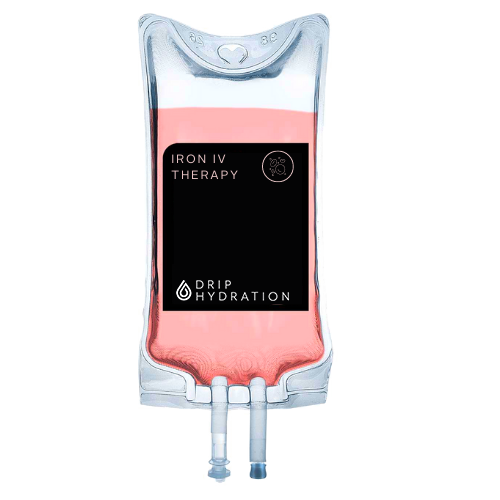
What To Expect
Iron Infusions are medical treatments that require screening labs. Prior to your visit, our providers will need to see a copy of recent (within 30 days) lab test results. If you haven’t had lab tests completed, we can assist by ordering the appropriate diagnostics. See the FAQ section below for the required list of lab tests.
Price: $799 (May vary per location)
Recommended add-on: Myers Cocktail IV – $199 (May vary per location)
Benefits of Iron IV Therapy
Without a sufficient amount of iron, your body doesn’t produce enough red blood cells. This can lead to a wide range of problems, such as decreased immune function, chronic inflammatory diseases, fatigue, and more. Iron IV therapy can correct low iron levels to help you feel your best.
Intravenous iron treatments can help with:
- Fatigue
- Dizziness
- Headache
- Shortness of breath
- Chest pain
- Cold hands and feet
- Pale skin

How it Works
Hear From Our Clients
Book Iron IV Therapy
Returning customer? You can login here or continue as a guest checkout
Frequently Asked Questions
How do I prepare for an iron infusion?
Prior to your iron infusion, your doctor will give you instructions on how to prepare. However, there are also some general things you can expect to do on the morning of your infusion.
- Eat your normal meals; iron IVs don’t require you to fast
- Take your medications as usual (unless your doctor instructs otherwise)
- Be prepared to have a small IV drip put in your arm or hand
- Wear loose and comfortable clothing and make sure that you can roll your sleeves up for the IV
- Have some type of entertainment on hand for the infusion, such as a book, game, or movie
- Make sure you’ve set aside enough time for your infusion, as this IV drip can take several hours to administer
You may feel nervous about your iron infusion. You can help reduce any anxieties by talking about the procedure with your doctor first. They can recommend ways to help you stay comfortable and relaxed during the procedure.
What happens during an iron infusion?
An in-home iron infusion will take place at your residence. On the morning of your appointment, a registered nurse or doctor will arrive at your address with all of the equipment needed for your appointment.
They will have you sit down in a comfortable place, sterilize your arm, and use a needle to insert a catheter into a vein. Most patients feel a small pinch as the needle is inserted. The needle will be removed once the catheter is properly situated in the vein. The catheter is connected by a tube to your iron infusion bag and uses gravity to drip fluids down the tube and into your vein.
You will first be given a small test dose to make sure you don’t have any adverse reactions from the procedure. The infusion will be stopped if you have an adverse reaction.
These reactions can include:
- Anaphylaxis
- Shock
- Severe hypotension (low blood pressure)
- Collapse
- Loss of consciousness
If you do not have an adverse reaction, the procedure will continue. Most iron infusions last for several hours, during which time you can watch TV, read a book, or even work. Your nurse will stay onsite during the procedure to monitor your progress.
How long does an iron infusion take?
An iron infusion typically takes between 3 – 4 hours, although it can take longer in some cases. You should expect to remain seated during this time.
Some patients need multiple iron infusions to properly replenish iron levels. In these cases, you may have multiple iron infusions over the course of several weeks.
How do I know if I have an iron deficiency?
The only way to know if you have an iron deficiency is to get tested and diagnosed by a medical professional. Iron deficiency has many potential symptoms, many of which overlap with other medical conditions.
If you experience the symptoms below, speak with your doctor about getting tested for iron deficiency:
- Fatigue and restlessness
- Chronic headaches
- Dizziness
- Brittle nails
- Unusual cravings
- Hair loss
- Menstrual irregularities / Heavy periods
- Restless leg syndrome
- Pale or yellow skin
- Shortness of breath
- Chest pain
- Weakness
- Cold hands & feet
- Jaundice
- Lethargy
What tests are used to diagnose an iron deficiency?
An iron deficiency must be diagnosed by lab tests. These tests may measure:
- Ferritin: A blood protein that contains iron. This measurement can help your doctor understand how much iron your body is currently storing.
- Hemoglobin (HB): A blood protein that aids in transporting oxygen throughout your body.
- Transferrin saturation (TSAT): A measurement that compares how much iron is currently in your bloodstream to the maximum amount that transferrin is able to transport.
- Complete blood count (CBC): A panel that measures the current levels of your red blood cells, white blood cells, hemoglobin, and platelets.
What are the possible side effects and complications?
There is no need for down time after an iron infusion, so you can return to your normal activities right away.
You may have some minor side effects after the procedure. Most of them are mild and will resolve on their own. These may include:
- Temporary changes in taste
- Headaches
- Nausea and vomiting
- Joint pain
- Shortness of breath
- Itchiness and rash
- Increased or decreased blood pressure or heart rate
- Redness or swelling at the site of the injection
Serious side effects
Iron toxicity is a rare but serious complication of iron infusions. This condition refers to excess iron in your system. It’s possible to overdose quickly, such as taking an iron supplement and overloading your system all at once. It’s also possible to gradually build up excess iron in your body over time.
The test dose and the slow infusion rate can help prevent iron toxicity. Your nurse will also remain with you during the appointment to monitor your progress and watch for any adverse symptoms.
Iron IV treatments vs oral supplements
If you’re wondering whether you should get an iron IV infusion or take supplements, here are some considerations about each.
Iron supplements
- Oral iron supplements are convenient to take alongside your daily multivitamins and medications. They are also easy to obtain from pharmacies and online retailers.
- However, they are often harsh on your stomach. They will also take time to work since they must first pass through your digestive system.
Iron IV infusions
- Iron IV infusions are administered directly into the bloodstream, so there’s no risk of stomach upset. Intravenous iron is also immediately available for your cells to use, so your body can get straight to work replenishing iron stores. This means that conditions such as anemia can be treated both quickly and efficiently.
- However, iron IV infusions may not be suitable for people who have a fear of needles. They also take several hours to administer per infusion, which can be challenging to schedule in for people with busy daily lives.
What are the benefits of an iron infusion?
Iron infusions are typically recommended for people who have low levels of iron due to certain medical conditions or who have difficulty absorbing iron through the gut. Iron infusions replenish your body’s iron stores far more quickly than supplements or diet changes.
The benefits of an iron infusion include:
- Quickly restored iron levels
- Improved energy
- Easier breathing
Depending on the reason that you need an iron infusion, your doctor may recommend supplements and dietary changes to help maintain your iron levels after treatment.

